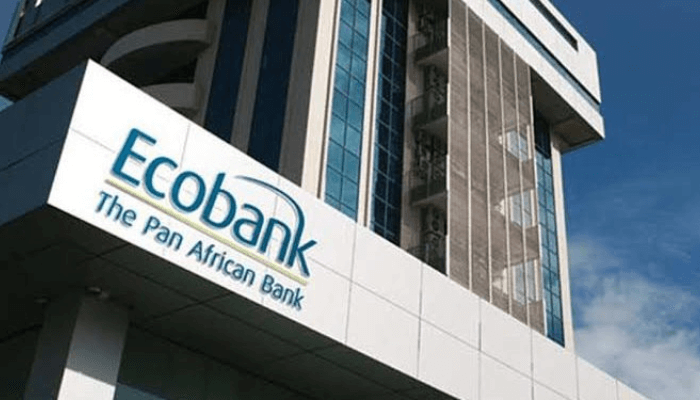
Ecobank Nigeria is facing a mounting financial crisis, exacerbated by the Central Bank of Nigeria (CBN)’s decision to end the moratorium on forbearance exposures for Nigerian banks.
According to a corporate disclosure released on July 9, the group, Ecobank Transnational Incorporated (ETI), is looking to raise $250 million in additional tier-1 instruments in 10 days. The group noted that the raise will come in the form of private placements.
The urgency to raise capital is driven by mounting liquidity pressures. These pressures are largely a result of Ecobank Nigeria’s deteriorating credit risk profile and the rising threat of default.
According to the group’s 2024 annual report, approximately 76.6 per cent of Ecobank Nigeria’s gross loan portfolio falls under Stage 2 and Stage 3, which, under IFRS 9, require full lifetime expected credit loss provisions. This distress is largely driven by the Nigerian bank’s overexposure to the oil and gas sector, a traditionally volatile segment of the Nigerian economy.
Read Also: Ecobank Transnational raises $250m additional tier 1 capital via private placement – Businessday NG
On June 30, the CBN officially lifted the moratorium on regulatory forbearance and reinstated the single obligor limit. This regulatory shift comes at a particularly challenging moment for Ecobank Nigeria, which is already grappling with severe credit stress and a breach of its minimum capital adequacy ratio (CAR). As a result, S&P Global downgraded the bank to CCC-, citing its deteriorating financial condition. The bank’s CAR currently stands at approximately 7 per cent, well below the regulatory minimum of 10 per cent. In response to this breach, the bank, with bondholder approval, removed the CAR covenant from the terms of its $300 million bond notes.
Moody’s and S&P flag capital risk
The crisis at Ecobank Nigeria has cast a long shadow over its parent company, Ecobank Transnational Incorporated (ETI). In March 2025, Moody’s downgraded ETI to B3 with a negative outlook, highlighting that the recapitalisation burden of Ecobank Nigeria is straining the group’s credit profile.
According to Moody’s, “the required capital injection from ETI into Ecobank Nigeria is expected to significantly weigh on ETI’s liquidity and double leverage ratio.”
The double leverage ratio is a key financial measure that evaluates how much of a holding company’s investment in subsidiaries is funded by debt instead of equity. In simple terms, it signals how much risk the parent is taking to fund its operations through borrowed money.
With a double leverage of 174 per cent as of end-2023, ETI finds itself in a precarious liquidity position, much like its Nigerian subsidiary. Analysts suggest this financial strain is contributing to Nedbank’s decision to exit its 21.22 per cent stake in ETI, Nedbank being the group’s largest strategic shareholder.
S&P went further by assigning a negative outlook to Ecobank Nigeria alongside the CCC-rating, stating that a default appears inevitable unless the bank can raise at least $150 million in Additional Tier-1 capital within six months. The rating agency expressed scepticism, warning that “the uncertain economic environment could make it more difficult to boost capital by such means.”
Ecobank’s asset quality issues
Although the bank’s minimum paid-up share capital has exceeded the regulatory minimum of N200 billion, its asset quality remains questionable. Outside of the CAR requirements, the bank’s equity-to-asset ratio is at 6.8 per cent. Although this can be described as typical for a bank, however, it severely lags GTCO’s 18.4 per cent, Zenith’s 13.4 per cent, and UBA’s 11.3 per cent.
Even more unsettling is the quality of the bank’s exposures. At the end of FY 2024, the bank had a NPL coverage ratio of 38.2 per cent, with an even lower Stage 3 coverage ratio of 18.9 per cent. In simpler terms, the bank had only set aside enough provisions to cover 38.2 per cent of its non-performing loans, and just 18.9 per cent of its most serious problem loans (Stage 3).
In all of this, the bank has outlined capital restoration plans, including a move to issue a $200 million Additional Tier-1 Bond in four tranches of US$50 million each. The bank is also looking to reduce its $300 million in risk-weighted assets through loan sales to eligible third parties. Then it also announced plans to convert up to $200 million in dollar-denominated loans to Naira.
However, analysts and market observers are pessimistic. An observer who craved anonymity noted,
“Who is going to buy $200 million AT-1 instruments when the loan book is 75 percent in default? Also, early redemption of promissory notes would effectively move ETI closer to bankruptcy, too, as you see in their own ratings reports, they have liquidity problems.”




